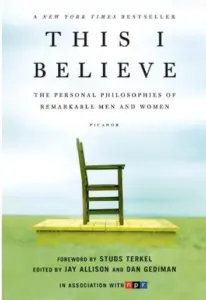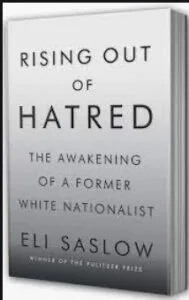Past Common Reads
This I Believe, was originally a five-minute radio series hosted from 1951 -1955 by acclaimed journalist Edward R. Murrow. Murrow asked Americans from all walks of life to write essays about their most fundamental and closely held beliefs that guide their daily lives. This radio series became a cultural phenomenon with people reading their own personal motivation in life on the air. Eighty-five leading newspapers printed a weekly column based on This I Believe. Each day, some 39-million Americans gathered by their radios to hear compelling essays from the likes of Eleanor Roosevelt, Jackie Robinson, Helen Keller and Harry Truman as well as corporate leaders, cab drivers, scientists and secretaries — anyone able to distill into a few minutes the guiding principles by which the lived. A collection of essays published in 1952 sold 300,000 copies — second only to the Bible that year. The series was translated and broadcast around the globe on the Voice of America. A book of essays translated into Arabic sold 30,000 copies in just three days.
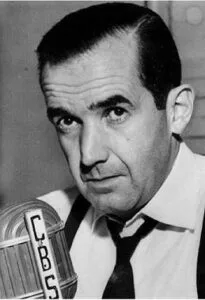
Edward R. Murrow Edward Roscoe Murrow was an American broadcast journalist and war correspondent. He first gained prominence during World War II with a series of live radio broadcasts from Europe for the news division of CBS. Murrow invented radio news, as we know it and was the standard-bearer of journalism, ethics, and reporting. Many consider him the father of broadcast journalism.
In reviving and reinvigorating This I Believe, the authors goal is not to persuade Americans to agree on the same beliefs. Rather, we hope to encourage people to begin the much more difficult task of developing respect for beliefs different from their own. Fifty years ago, Edward R. Murrow’s project struck such a chord with millions of Americans. It can do so again today.
Based on the NPR series of the same name, This I Believe features eighty Americans―from the famous to the unknown―completing the thought that the book’s title begins. Each piece compels readers to rethink not only how they have arrived at their own personal beliefs but also the extent to which they share them with others.
Author Biography
Jay Allison
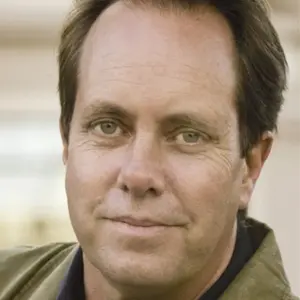
Jay Allison is one of public radio’s most honored producers. He has produced hundreds of nationally broadcast documentaries and features for radio and television. His work has earned him the duPont-Columbia and five Peabody Awards, and he was the 1996 recipient of the Corporation for Public Broadcasting’s Edward R. Murrow Award for outstanding contributions to public radio, the industry’s highest honor. He was the curator and producer of This I Believe on NPR and he produces The Moth Radio Hour. Before his career in broadcasting, Jay was a theater director in Washington, D.C. He is also the founder of the public radio stations for Martha’s Vineyard, Nantucket, and Cape Cod where he lives.
Dan Gediman

Dan Gediman is the executive producer of This I Believe. His work has been heard on All Things Considered, Morning Edition, Fresh Air, Marketplace, Jazz Profiles, and This American Life. He has won many of public broadcasting’s most prestigious awards, including the duPont-Columbia Award.

Book Description
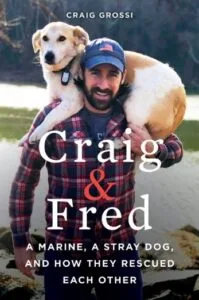 Craig & Fred: A Marine, A Stray Dog, and How They Rescued Each Other
Craig & Fred: A Marine, A Stray Dog, and How They Rescued Each OtherThe uplifting and unforgettable true story of a US Marine, the stray dog he met on an Afghan battlefield, and how they saved each other and now travel America together, “spreading the message of stubborn positivity.”
In 2010, Sergeant Craig Grossi was doing intelligence work for Marine RECON—the most elite fighters in the Corps—in a remote part of Afghanistan. While on patrol, he spotted a young dog “with a big goofy head and little legs” who didn’t seem vicious or run in a pack like most strays they’d encountered. After eating a piece of beef jerky Craig offered—against military regulations—the dog began to follow him. “Looks like you made a friend,” another Marine yelled. Grossi heard, “Looks like a ‘Fred.’” The name stuck, and a beautiful, life-changing friendship was forged.
Fred not only stole Craig’s heart; he won over the RECON fighters, who helped Craig smuggle the dog into heavily fortified Camp Leatherneck in a duffel bag—risking jail and Fred’s life. With the help of a crew of DHL workers, a sympathetic vet, and a military dog handler, Fred eventually made it to Craig’s family in Virginia.
Months later, when Craig returned to the U.S., it was Fred’s turn to save the wounded Marine from Post-Traumatic Stress. Today, Craig and Fred are touching lives nationwide, from a swampy campground in a Louisiana State Park to the streets of Portland, Oregon, and everywhere in between.
A poignant and inspiring tale of hope, resilience, and optimism, with a timeless message at its heart—”it is not what happens to us that matters, but how we respond to it”—Craig & Fred is a shining example of the power of love to transform our hearts and our lives.
Author Biography
Craig Grossi
Craig Grossi is an eight-year Marine Corps veteran, and a recipient of the Purple Heart. After returning from Afghanistan, he worked for the Defense Intelligence Agency and attended Georgetown University. When not travelling with Fred, he works intensively with veteran organizations, including the USA Warriors Ice Hockey Program and the Tragedy Assistance Progams for Survivors (TAPS)

Book Description
Rising Out of Hatred: The Awakening of a Former White Nationalist
Derek Black grew up at the epicenter of white nationalism. His father founded Stormfront, the largest racist community on the Internet. His godfather, David Duke, was a KKK Grand Wizard. By the time Derek turned nineteen, he had become an elected politician with his own daily radio show–already regarded as the “the leading light” of the burgeoning white nationalist movement. “We can infiltrate,” Derek once told a crowd of white nationalists. “We can take the country back.”
Then he went to college. At New College of Florida, he continued to broadcast his radio show in secret each morning, living a double life until a classmate uncovered his identity and sent an email to the entire school. “Derek Black … white supremacist, radio host … New College student???” The ensuing uproar overtook one of the most liberal colleges in the country. Some students protested Derek’s presence on campus, forcing him to reconcile for the first time with the ugliness of his beliefs. Other students found the courage to reach out to him, including an Orthodox Jew who invited Derek to attend weekly Shabbat dinners. It was because of those dinners–and the wide-ranging relationships formed at that table–that Derek started to question the science, history, and prejudices behind his worldview. As white nationalism infiltrated the political mainstream, Derek decided to confront the damage he had done.
Author Biography
Eli Saslow Washington, D.C.
Reporter on the National desk. Education: Syracuse University, 2004Eli Saslow is an author and a staff writer for The Washington Post, where he travels the country to write in-depth stories about the impact of major national issues on individual lives. He won the 2014 Pulitzer Prize in Explanatory Reporting for a series of stories about the rise of food stamps and hunger in the United States. He was a finalist for the Pulitzer Prize in feature writing in 2013, 2016 and 2017. Both of his books were published by DoubleDay: Rising out of Hatred and Ten Letters: The Stories Americans Tell Their President. An occasional contributor to ESPN the Magazine, four of his stories have been anthologized in Best American Sportswriting. He is the winner of a Polk Award, a James Beard Award for Food Writing, a PEN America Award and several journalism honors. A 2004 graduate of Syracuse University, he now lives in Portland with his wife and three children.Honors & Awards:
- 2014 Pulitzer Prize for Explanatory Reporting
- 2017 Pulitzer Prize finalist for Feature Writing
- 2016 Pulitzer Prize finalist for Feature Writing
- 2013 Pulitzer Prize finalist for Feature Writing
- 2017 PEN Center USA Literary Award for Journalism
- 2017 Mike Berger Award for Human Interest Reporting
- 2017 Dori J. Maynard Award for Justice in Journalism
- 2014 George Polk Award for National Reporting
- 2014 James Beard Award for Food Writing
- 2014 ASNE Award for non-deadline writing
- 2015 Sigma Delta Chi Award for Feature Reporting
- 2013 Mayborn Best American Newspaper Narrative Contest, First Place
- 2013 Darrell Sifford Memorial Prize in Journalism, Missouri School of Journalism
- 2014 Mayborn Best American Newspaper Narrative Contest, First Place
- 2016 DART Award for Excellence in Trauma Reporting
Book Description
What the Eyes Don’t See A Story of Crisis, Persistence, and Hope in an American City This is the inspiring story of how Dr. Mona Hanna-Attisha, alongside a team of researchers, parents, friends, and community leaders, discovered the children of Flint, Michigan, were being exposed to lead in their tap water—and then battled her own government and a brutal backlash to expose that truth to the world. Paced like a scientific thriller, What the Eyes Don’t See reveals how misguided austerity policies, broken democracy, and callous bureaucratic indifference placed an entire city at risk. And at the center of the story is Dr. Mona herself—an immigrant, doctor, scientist, and mother whose family’s activist roots inspired her pursuit of justice. What the Eyes Don’t See is a riveting account of a shameful disaster that became a tale of hope, the story of a city on the ropes that came together to fight for justice, self-determination, and the right to build a better world for their—and all of our—children.
Author Biography
Mona Hanna-Attisha MD, MPH, FAAP

Mona Hanna-Attisha, MD, MPH, FAAP Dr. Mona Hanna-Attisha is the crusading pediatrician who first researched and revealed the lead in the blood of children in Flint, Michigan. She continues to work to mitigate the impact of the water crisis on Flint’s children. In her powerful book, What the Eyes Don’t See, and her personal and inspiring speeches, she motivates audiences to speak out against injustice. Dr. Mona is founder and director of the Michigan State University and Hurley Children’s Hospital Pediatric Public Health Initiative, an innovative and model public health program in Flint, Michigan. A pediatrician, scientist, activist and author, Dr. Mona has testified three times before the United States Congress, awarded the Freedom of Expression Courage Award by PEN America, and named one of Time magazine’s 100 Most Influential People in the World for her role in uncovering the Flint Water Crisis and leading recovery efforts. She has appeared on CNN, MSNBC, BBC and countless other media outlets championing the cause of children in Flint and beyond. She is founding donor of the Flint Child Health and Development Fund (flintkids.org). Dr. Mona received her Bachelor’s and Master of Public Health degrees from the University of Michigan and her medical degree from Michigan State University College of Human Medicine. She completed her residency at Children’s Hospital of Michigan in Detroit, where she was chief resident. She is currently an Associate Professor of Pediatrics and Human Development and a C.S. Mott Endowed Professor of Public Health at Michigan State University.

Book Description
“Long before the word ‘entrepreneur’ became popular, the concept still existed.” In the late 1950s, Glen Allan, Mississippi was a poor cotton community. For many, it was a time and place where opportunities were limited by social and legal constraints that were beyond their control. It was a time and place where few dared to dream. For most, the work was in the fields where the sun was hot, the days were long and the wages were low. It was an accepted way of life that had been passed down for generations and, from the time young Clifton Taulbert could walk, he too was expected to climb aboard Mr. Walter’s field truck and find his place among his peers. Yet one man made a difference – an unlikely entrepreneur who defied convention and dared to dream. That man was Clifton’s Uncle Cleve. Based on his own life experience, Pulitzer nominee Clifton Taulbert has teamed up with entrepreneurial thought leader Gary Schoeniger to create Who Owns the Ice House? – a powerful and compelling story that captures the essence of an entrepreneurial mindset and the unlimited opportunities it can provide. Drawing on the entrepreneurial life lessons he gained from his Uncle Cleve, Who Owns the Ice House? chronicles Taulbert’s journey from his life in the Mississippi Delta at the height of legal segregation to being recognized by Time Magazine as “one of our nation’s most outstanding emerging entrepreneurs.” While Taulbert describes the life-changing influence of his Uncle Cleve, Schoeniger captures the entrepreneurial life lessons, their timeless application and the unlimited opportunities they can provide. Who Owns The Ice House? delivers an important message, one that reaches into the past to remind us of the timeless and universal principles that can empower anyone to succeed.
Author Biography
Clifton Taulbert According to Clifton L. Taulbert, noted author and entrepreneur businessman, he could have failed had he not encountered community builders and entrepreneurial thinkers early on in his life. Taulbert was born on the Mississippi Delta during the era of legal segregation where he completed his secondary education. Though opportunities were few and barriers were plentiful, Taulbert managed to dream of being successful, not knowing the shape that success would take. Today Taulbert is the President and CEO of the Freemount Corporation (a human capital development company) serving clients nationally and internationally-Fortune 500 Companies, small businesses, federal agencies, professional organizations, community colleges and K-12 leadership. Additionally, entrepreneur Taulbert is the President and CEO of Roots Java Coffee-an African-American owned national coffee brand, importing coffee from Africa. To pass his life lessons along, Taulbert shares his entrepreneurial journey with others as a Thrive15.com mentor. Following high school graduation and a short banking career in Saint Louis, Taulbert enlisted in the United States Air force. After successfully serving in the 89th Presidential Wing of the United States Air Force in the late 1960s, Taulbert was honorably discharged and continued his college education, graduating from Oral Roberts University and the Southwest Graduate School of Banking at Southern Methodist University. During those years, Taulbert was quietly writing. His first book Once Upon A Time When We Were Colored became a national best seller, a major motion picture and a requested gift for Nelson Mandela upon his release from prison. Eight Habits of the Heart, one of Taulbert’s thirteen books garnered him an invitation by former Supreme Court Justice, Sandra day O’Connor to address members of the court and their invited guests. Taulbert’s literary work ignited the journey that has taken him throughout the world. As a recognized thought leader on the issues of community, Taulbert has lectured at Harvard University Principals Center and the United States Air Force Academy. Gary Schoeniger Gary Schoeniger, has emerged as an internationally recognized thought leader in the field of entrepreneurial mindset education. As the founder of the Entrepreneurial Learning Initiative, Schoeniger has influenced a broad audience from higher education and economic development organizations to government, corporate and non-profit clients worldwide including the Ewing Marion Kauffman Foundation, the Cisco Entrepreneur Institute and the U.S. State Department. Schoeniger also led the development of the Ice House Entrepreneurship Program, which has been recognized by the Kauffman Foundation as “redefining entrepreneurship education in classrooms and communities around the world”. With his focus on the entrepreneurial mindset, Schoeniger has presented numerous keynotes, workshops and training programs throughout the US and abroad. Recent engagements include the Global Entrepreneurship Congress in Rio de Janeiro and Moscow, as well as speaking and training programs in Athens, London, Bogota, Buenos Aires, Mexico City, Sofia, Santiago, Aberdeen, Nicosia, Zagreb, Tbilisi and Baku. Schoeniger, along with Pulitzer nominee Clifton Taulbert, is also the co-author of Who Owns The Ice House: Eight Life Lessons From An Unlikely Entrepreneur, an international bestseller described as “required reading for humanity”.
 Ebrahim’s book explores his own choice of love over bigotry and intolerance, against many daunting odds. When Ebrahim was seven his father shot and killed the founder of the Jewish Defense League, Rabbi Meir Kahane. From behind bars, his father El-Sayyid Nosair co-masterminded the 1993 bombing of the World Trade Center. He now dedicates his life to speaking out against terrorism and spreading his message of peace and nonviolence. Ebrahim traces his remarkable journey to escape his father’s legacy. Crisscrossing the eastern United States from Pittsburgh to Memphis, from a mosque in Jersey City to the Busch Gardens theme park in Tampa, The Terrorist’s Son is the story of a boy taught dogma and hate – and the man who chose a different path. Zak says of his father’s incarceration, “The fact that my father went to prison for an unfathomable crime when I was seven just about ruined my life. But it also made my life possible.”
Ebrahim’s book explores his own choice of love over bigotry and intolerance, against many daunting odds. When Ebrahim was seven his father shot and killed the founder of the Jewish Defense League, Rabbi Meir Kahane. From behind bars, his father El-Sayyid Nosair co-masterminded the 1993 bombing of the World Trade Center. He now dedicates his life to speaking out against terrorism and spreading his message of peace and nonviolence. Ebrahim traces his remarkable journey to escape his father’s legacy. Crisscrossing the eastern United States from Pittsburgh to Memphis, from a mosque in Jersey City to the Busch Gardens theme park in Tampa, The Terrorist’s Son is the story of a boy taught dogma and hate – and the man who chose a different path. Zak says of his father’s incarceration, “The fact that my father went to prison for an unfathomable crime when I was seven just about ruined my life. But it also made my life possible.”
 Four undocumented Mexican American students, two great teachers, one robot-building contest. In 2004, four Latino teenagers arrived at the Marine Advanced Technology Education Robotics Competition at the University of California, Santa Barbara. They were born in Mexico but raised in Phoenix, Arizona, where they attended an underfunded public high school. No one had ever suggested to Oscar, Cristian, Luis, or Lorenzo that they might amount to much—but two inspiring science teachers had convinced these impoverished, undocumented kids from the desert who had never even seen the ocean that they should try to build an underwater robot.
Four undocumented Mexican American students, two great teachers, one robot-building contest. In 2004, four Latino teenagers arrived at the Marine Advanced Technology Education Robotics Competition at the University of California, Santa Barbara. They were born in Mexico but raised in Phoenix, Arizona, where they attended an underfunded public high school. No one had ever suggested to Oscar, Cristian, Luis, or Lorenzo that they might amount to much—but two inspiring science teachers had convinced these impoverished, undocumented kids from the desert who had never even seen the ocean that they should try to build an underwater robot.  And build a robot they did. Their robot wasn’t pretty, especially compared to those of the competition. They were going up against some of the best collegiate engineers in the country, including a team from MIT backed by a $10,000 grant from ExxonMobil. The Phoenix teenagers had scraped together less than $1,000 and built their robot out of scavenged parts. This was never a level competition—and yet, against all odds . . . they won! But this is just the beginning for these four, whose story—which became a key inspiration to the DREAMers movement—will go on to include first-generation college graduations, deportation, bean-picking in Mexico, and service in Afghanistan. Joshua Davis’s Spare Parts is a story about overcoming insurmountable odds and four young men who proved they were among the most patriotic and talented Americans in this country—even as the country tried to kick them out.
And build a robot they did. Their robot wasn’t pretty, especially compared to those of the competition. They were going up against some of the best collegiate engineers in the country, including a team from MIT backed by a $10,000 grant from ExxonMobil. The Phoenix teenagers had scraped together less than $1,000 and built their robot out of scavenged parts. This was never a level competition—and yet, against all odds . . . they won! But this is just the beginning for these four, whose story—which became a key inspiration to the DREAMers movement—will go on to include first-generation college graduations, deportation, bean-picking in Mexico, and service in Afghanistan. Joshua Davis’s Spare Parts is a story about overcoming insurmountable odds and four young men who proved they were among the most patriotic and talented Americans in this country—even as the country tried to kick them out.
 The captivating story of a 91-year-old woman with a hidden past as an orphan-train rider and the teenage girl whose own troubled adolescence leads her to seek answers to long-buried questions. “A lovely novel about the search for family that also happens to illuminate a fascinating and forgotten chapter of America’s history. Beautiful.”—Ann Packer Between 1854 and 1929, so-called orphan trains ran regularly from the cities of the East Coast to the farmlands of the Midwest, carrying thousands of abandoned children whose fates would be determined by pure luck. Would they be adopted by a kind and loving family, or would they face a childhood and adolescence of hard labor and servitude?
The captivating story of a 91-year-old woman with a hidden past as an orphan-train rider and the teenage girl whose own troubled adolescence leads her to seek answers to long-buried questions. “A lovely novel about the search for family that also happens to illuminate a fascinating and forgotten chapter of America’s history. Beautiful.”—Ann Packer Between 1854 and 1929, so-called orphan trains ran regularly from the cities of the East Coast to the farmlands of the Midwest, carrying thousands of abandoned children whose fates would be determined by pure luck. Would they be adopted by a kind and loving family, or would they face a childhood and adolescence of hard labor and servitude?  As a young Irish immigrant, Vivian Daly was one such child, sent by rail from New York City to an uncertain future a world away. Returning east later in life, Vivian leads a quiet, peaceful existence on the coast of Maine, the memories of her upbringing rendered a hazy blur. But in her attic, hidden in trunks, are vestiges of a turbulent past. Seventeen-year-old Molly Ayer knows that a community service position helping an elderly woman clean out her home is the only thing keeping her out of juvenile hall. But as Molly helps Vivian sort through her keepsakes and possessions, she discovers that she and Vivian aren’t as different as they appear. A Penobscot Indian who has spent her youth in and out of foster homes, Molly is also an outsider being raised by strangers, and she, too, has unanswered questions about the past. Moving between contemporary Maine and Depression-era Minnesota, Orphan Train is a powerful novel of upheaval and resilience, of second chances, and unexpected friendship.
As a young Irish immigrant, Vivian Daly was one such child, sent by rail from New York City to an uncertain future a world away. Returning east later in life, Vivian leads a quiet, peaceful existence on the coast of Maine, the memories of her upbringing rendered a hazy blur. But in her attic, hidden in trunks, are vestiges of a turbulent past. Seventeen-year-old Molly Ayer knows that a community service position helping an elderly woman clean out her home is the only thing keeping her out of juvenile hall. But as Molly helps Vivian sort through her keepsakes and possessions, she discovers that she and Vivian aren’t as different as they appear. A Penobscot Indian who has spent her youth in and out of foster homes, Molly is also an outsider being raised by strangers, and she, too, has unanswered questions about the past. Moving between contemporary Maine and Depression-era Minnesota, Orphan Train is a powerful novel of upheaval and resilience, of second chances, and unexpected friendship.
 The captivating story of an ordinary bartender turned humanitarian who’s changing the world through clean water. Doc Hendley never set out to be a hero. A small-town bartender, Doc loved his Harley, music, and booze. Then he learned about the world’s water crisis, and decided to help by hosting fundraisers. But he wanted to do more and soon found himself traveling to one of the world’s most dangerous hot spots: Darfur, Sudan. Doc was immediately cast into a crisis zone. The Sudanese government was wiping out entire villages through horrific state-sponsored genocide—and one of the chief weapons was water. By dumping corpses in water sources and shooting up water bladders, Janjaweed terrorists doomed hundreds of thousands of citizens to dehydration, disease, and death. At just twenty-five years old, Doc was inexperienced, untrained, and in constant danger—but he stepped up to save lives. Alternatively begging international organizations for funding and dodging trigger-happy Janjaweed, Doc began drilling and repairing wells, bringing drinking water to those who desperately needed it. Wine to Water is his story about braving tribal warfare in far-flung regions of the world, and an inspirational tale of how one ordinary person can make a difference.
The captivating story of an ordinary bartender turned humanitarian who’s changing the world through clean water. Doc Hendley never set out to be a hero. A small-town bartender, Doc loved his Harley, music, and booze. Then he learned about the world’s water crisis, and decided to help by hosting fundraisers. But he wanted to do more and soon found himself traveling to one of the world’s most dangerous hot spots: Darfur, Sudan. Doc was immediately cast into a crisis zone. The Sudanese government was wiping out entire villages through horrific state-sponsored genocide—and one of the chief weapons was water. By dumping corpses in water sources and shooting up water bladders, Janjaweed terrorists doomed hundreds of thousands of citizens to dehydration, disease, and death. At just twenty-five years old, Doc was inexperienced, untrained, and in constant danger—but he stepped up to save lives. Alternatively begging international organizations for funding and dodging trigger-happy Janjaweed, Doc began drilling and repairing wells, bringing drinking water to those who desperately needed it. Wine to Water is his story about braving tribal warfare in far-flung regions of the world, and an inspirational tale of how one ordinary person can make a difference.

